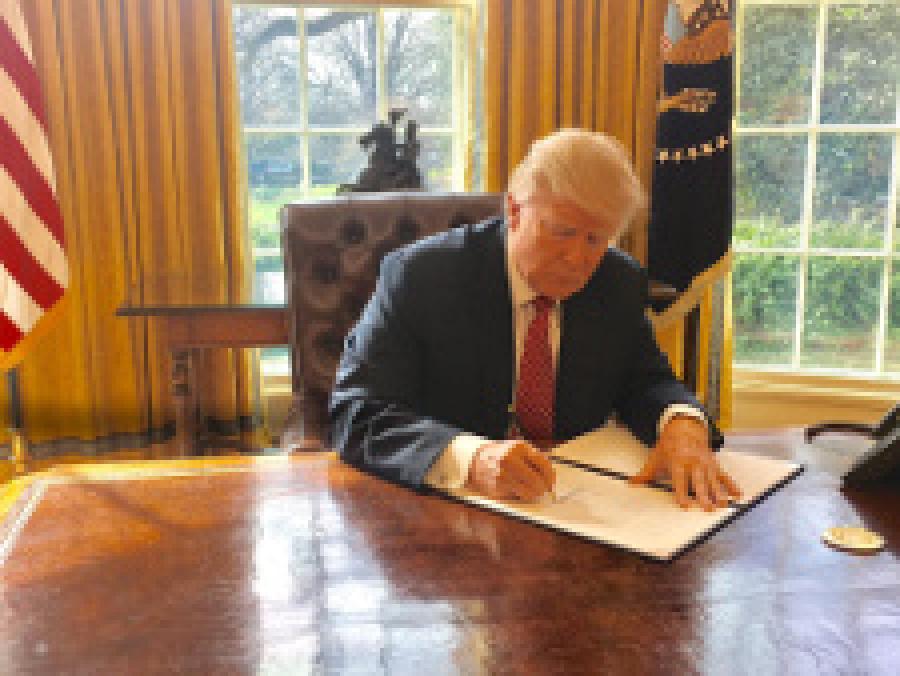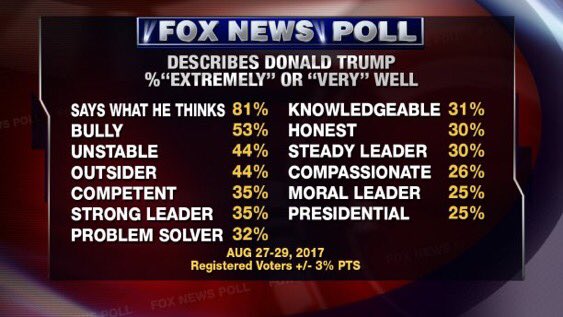How to Think Straight About Trump
Image

Quite a few conservative-ish Christians are not thinking straight about President Trump. The work of pollsters continues to reveal this. Conversations with believers, both online and in person, bear it out as well. My purpose here isn’t to pile up evidence critical of Trump’s character, political philosophy, and management style.
The weightier problem is the thought process many are using to evaluate the president. We’re not going to see what we need to see unless we put the whole matter in the right light first.
So here’s an effort at improving the light a bit—in six steps.
1. Understand that “the media” are irrelevant.
As soon as each new controversy regarding Trump’s conduct in office hits the news, supporters begin to point fingers at “the media.” They’re referring, of course, to the major television, web, and print outlets that are, in varying degrees, dominated by the left-leaning political perspective.
So-called conservative talk radio and TV are among the most consistent to use this sort of argument in Trump’s defense.
But they might as well complain about the traffic in California, the weather in Ireland, and how badly Nabisco has ruined the “Original” Wheat Thin. As true and unfortunate as these complaints are (especially the Wheat Thin!), they’re exactly as useful as the views of the liberal media for making a conservative evaluation of the actions of the president—any president.
What should matter to conservatives is how leaders measure up to conservative principles. Ranting about how unfair liberals are is worse than worthless—it’s a distraction from painful realities conservatives need to face about where they now stand in the Trump era, and what sort of future they should be aiming for in the post-Trump era.
2. Understand that Hillary is irrelevant.
More than nine months after the election, variations of “Well, at least we didn’t get Hillary,” or “Hillary would have been worse” or “I suppose you wanted Hillary to win!” are still commonplace. Conservatives are often characterized as being stuck in the past, and it’s interesting how stuck many of them are on that particular past.
Let’s stipulate that a Hillary Clinton presidency would have been an unmitigated disaster. That observation is of no use at all for measuring the effectiveness of the president we have now. For one thing, it changes nothing. I could mock the Three Stooges all day, and it wouldn’t raise my I.Q. a single point. I could decry the evil of Kermit Gosnell whenever someone criticizes my character—it wouldn’t make me a better human being. In both cases, I might manage to create the illusion that I’m smarter or more righteous than I really am, but the effort itself would be stupid and wrong, for one simple reason: these people are not standards for evaluating wisdom and virtue.
Hillary is a distraction. When it comes to making conservative judgments about what’s happening in the Oval Office, what standard should conservatives use? —not the opinions of liberal media leaders, and certainly not the expected conduct of presidents who never were.
3. Understand that past liberal Presidents are irrelevant.
Along with “but the media” and “but Hillary,” many on the right are quick to turn to “but Obama” and “but Clinton.” But these are all clutter and distraction. Just as the opinions of liberal media and the qualities of liberal presidents-who-never-were don’t change anything and aren’t a conservative standard, so also past actual presidents from the left are of no use.
As Trump-defenses go, the Obama or Clinton reference tends to go beyond irrelevant and cross over into just weird. Here’s a common sequence:
- Critic: President Trump should not have done A. It’s wrong, foolish, and not conservative.
- Defender: Yeah, well Obama did A all the time, and Clinton, too!
- Critic: (Scratches head, shrugs, walks away. How do you answer a counterargument that just made your own point for you?)
4. Understand resemblance to Reagan and Bush.
A bit of reasoning on the right—usually dressed up a lot to make it sound smarter—amounts to this:
“They” said Reagan was an idiot. “They” also said Bush was an idiot. Now, “they” say Trump is an idiot. Therefore, Trump is brilliant, like Reagan!
Well, that settles it—unless you already understand that it’s never been weighty to conservatives what “they” say about presidents (see item 1, above). And unless you understand that I’m not a brilliant scientist.
- People said Galileo was wrong.
- People said Einstein was wrong.
- People say I’m wrong.
- Therefore I’m a brilliant scientist like Galileo and Einstein!
(So how about that large research grant? I’ll just wait here by the phone.)
5. Understand what conservatism is.
Conservatism is not glandular. It’s not impulsive. It’s not even reactionary.
While it’s true that there is no single agreed-upon definition, there is considerable overlap in understandings of conservatism over the decades (and, by other names, over the centuries). Conservatism is a set of convictions and a way of thinking about human nature, the nature of society, and the role of government.
It’s a political philosophy, not a set of positions on current issues—much less a set of slogans and clichés.
A politician can favor a variety of the same policy preferences as conservatives, and utter lots of conservative-seeming soundbites, and not have a conservative way of thinking at all. And without a conservative way of thinking, none of his positions even begin to be truly conservative.
Russel Kirk is a lot to wade through, but his Ten Conservative Principles from A Conservative Mind are a good place to start. Thomas Sowel’s Conflict of Visions especially develops the sixth of the Kirk’s ten points (human imperfectability)—in a fairly accessible way. Edmund Burke’s political thought is wide-ranging and copious, but the The Burke Society is of some help for taking in digestable portions of his work.
A little grasp of what it means to look at society conservatively, rather than just repeating allegedly conservative reactions and touting allegedly conservative slogans, goes a long way toward putting our current president in the right light.
6. Understand how the sovereignty of God relates to rulers.
I often hear the argument that God must have given us Trump for a good reason, or, in the context of rejoicing over Trump’s rise to power, I see exaltations of the sovereignty of God in raising up and taking down rulers.
But where was this rhetoric when Obama was elected?
It’s certainly true that:
- God raises up rulers and takes them down – Daniel 2:21
- God directs the hearts of rulers – Proverbs 21:1
- Rulers are God’s servants for promoting good and punishing evil – Romans 13:1-4, 1 Peter 2:14
- Rulers are to be respected – 1 Peter 2:17
Let’s be clear, though, about some other facts, and what follows and doesn’t follow from the points above. It’s also true that:
- God hardens the hearts of rulers as a form of judgment – Exodus 4:21, 7:3; Joshua 11:18-20
- God disapproves of specific actions of rulers and punishes them – 1 Kings 16:30, 17:1
- Scripture warns us against evil and foolish rulers and their oppressive ways – Proverbs 28:15-16
- God works all things according to the counsel of His will, not just the good things – Isaiah 46:10, Ephesians 1:11
The sovereignty of God does not argue for giving any particular U.S. president a pass on bad behavior in office, nor does it offer us any assurance that a particular ruler will do more good than harm for his country and citizens relative to other rulers. Furthermore, in a system where law is king, the biblical call to “honor the king” is not a command to speak only praises of the head of the executive branch.
There is less than zero reason for thinking the Bible is more friendly toward Trump than other world rulers or other U.S. presidents—“less than” zero, because this president claims (at least sometimes) to have the thriving of Christians and Christian beliefs high in his values and goals.
That sets a higher standard for evaluating him, not a lower one.
Aaron Blumer 2016 Bio
Aaron Blumer is a Michigan native and graduate of Bob Jones University and Central Baptist Theological Seminary (Plymouth, MN). He and his family live in small-town western Wisconsin, not far from where he pastored for thirteen years. In his full time job, he is content manager for a law-enforcement digital library service. (Views expressed are the author's own and not his employer's, church's, etc.)
- 24 views

Aren’t the first and last items what America has wanted for a long time?
First: He isn’t politically correct
Last: He isn’t politically correct
I’m actually surprised that only 44% said he both unstable and an outsider. I find him to be very unstable, and he most certainly is an outsider.
Ashamed of Jesus! of that Friend On whom for heaven my hopes depend! It must not be! be this my shame, That I no more revere His name. -Joseph Grigg (1720-1768)



Discussion